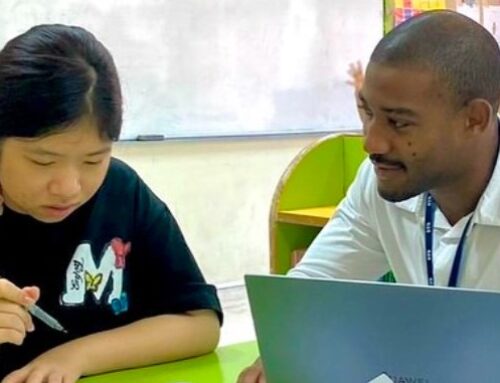By Ken, Teacher in Warsaw
In this blog we will have a look at teaching more advanced students and what we should do so that we keep them engaged and also make them feel like they are still learning despite their relatively high English proficiency. From past tense to past progressive, from conditionals to collocations, they should be adept at most things. So if they are adept at most things, how can we teach them and still introduce new things?
Conversation and contemplation
Most advanced students will want to focus on conversation practice.
As you may expect, since most students work in non-English speaking offices and/or don’t need to use their native language in their daily lives, they lack opportunities to practise English and therefore forget a lot of what they have learnt. The big advantage of teaching advanced students is that you can talk to them about almost anything and they will be able to formulate a response. But what is best to talk about?
As the heading of this paragraph suggests, anything that they need to think deeply about before giving an answer is always a sure-fire winner at least in my experience. Also anything that encourages them to give their own opinions and different perspectives works well (of course stay away from sensitive topics such as religion as Poland is still a very religious country however I’ve heard the younger generations are beginning to shy away from the church). I also tend to stay away from “easy” topics such as “what food do you like?” as it’s not a stimulating conversation and doesn’t include much thinking. A good example of something I did recently in a lesson is comment on the recent marches in Poland protesting against the changes the government had made. Do you agree with the changes? What changes would you make if you were in charge? Hypotheticals are also very useful activities and can be really interesting. What would you do if you had a million zloty? Is one of my favourites especially if it is a lesson about investments and conditionals.
It could be argued that anything political shouldn’t be discussed in lessons, however if you already have a good connection with your students and you know them well then I don’t really see an issue. Of course I wouldn’t recommend strongly promoting your own views on sensitive topics!

A fountain of (English and cultural) knowledge
Experiences may vary, but generally my advanced students enjoy learning about myself and my own experiences of travelling and living in different countries. They’re also very interested in idioms and other such phrases and I have also taught them some more casual, everyday language and also different dialects that exist in the UK. While I was doing that it really hit home that English is difficult enough without adding in all the slang words that we use for different various things depending on where we’re from! Having lived in Manchester (the North West of England), the phrase “our kid” is a well-known phrase (which is a nice way of saying friend, mate or pal), however in Newcastle (the North East of England) you would say “pet” instead! I could go on forever about the differences……..but to summarise, anything different from what you would find in an English textbook is a winner! Extended uses of phrasal verbs are also very interesting as well as “irregularities” in English. I mean, why on earth is it spelt “queue”, and why is “photograph” pronounced differently to “photographer”? Just some small things I add into a lesson to mix things up!

Go with the flow
As well as practising their conversational skills, advanced students will also want to improve their flow when speaking. Each conversation I have is almost the same as the conversations I have with native speakers. At this stage you shouldn’t have to correct their grammar too much and it’s all about improving their fluency and their vocabulary range. The most common mistakes I correct are normally when students use the wrong word in speech. If you do everything that I mentioned previously in the last two paragraphs then their fluency and proficiency should get better. And all you’ve done is speak to them! Easy, right? Just make sure to choose topics that will get the students talking and thinking.
Afterthoughts
All in all, I much prefer teaching advanced students than beginner students. A lot of teachers I speak to insist that teaching inexperienced students is better but I’d honestly disagree! With advanced students you can have some great conversations as you would with any of your friends and you can also share experiences and opinions without thinking too much if what you’re going to say will be understood or not. Some teachers can feel a little intimidated by advanced students but for me personally, I enjoy this challenge and am always able to teach them something interesting and talk about something that will provoke a response and stimulate their cranial cavities. It helps having lived in many countries and having had many jobs!
If you’d like to see what opportunities are available this year, why not explore our programs page or submit an application?




